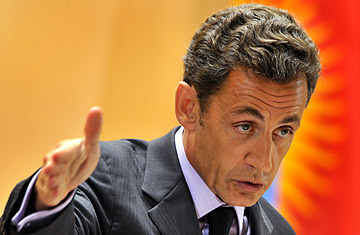
French President Nicolas Sarkozy
Officials in the European Union responded to Ahmadinejad's victory — and the protests and police crackdown it generated — in the same way they've reacted to recalcitrant Iranian regimes for years: with their policy of "constructive engagement" that balances pragmatic exchange with Tehran alongside condemnation of its troublesome behavior. In that spirit, European Union and individual European government leaders fretted less about Ahmadinejad's re-election than about accusations of fraud and police violence meted out to protesting Mousavi supporters. On Monday, German authorities called for an inquiry into the allegations of election-rigging, while in Brussels, a meeting of E.U. Foreign Ministers echoed support for an investigation and called on Tehran to cease repressing demonstrations with violence.
Despite that, E.U. officials who have led international negotiations with Iran on its renouncing its nuclear program may actually feel more comfortable with the hard-liner Ahmadinejad fronting the Tehran regime than a moderate like Mousavi — whose refusal to give in on the nuclear issue would be harder to explain. That's especially true for French President Nicolas Sarkozy, who has staked out an inflexible stance toward Iranian nukes that impressed even Bush Administration officials. "Mahmoud Ahmadinejad is there," said Sarkozy adviser Henri Guaino, warning the Iranian leader to bend to international will in the nuclear dossier and threats against Israel. "Otherwise, we're doubtless heading for a catastrophe."